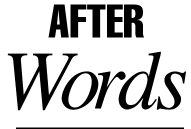
The Rochester Review, University of Rochester, Rochester, New York, USA


The poet Gwendolyn Brooks has described poetry as "life distilled." Henry Wadsworth Longfellow once called music "the universal language of mankind." Somewhere in between lies an art form known as jazz poetry, and that is the passion of another poet, Sascha Feinstein.
Feinstein--a Lycoming College English professor by vocation and a jazz aficionado by disposition--admits to a compulsion to bring jazz poetry to the forefront. So far the compulsion has resulted in two anthologies, a retrospective, and a bibliography, all devoted to poems informed by jazz music.
The anthologies have been collaborations with fellow devotee Yusef Komunyakaa, a Pulitzer Prizewinning poet who acts as co-editor. The two first connected in 1986 at Indiana University, where Komunyakaa was a teacher and Feinstein a graduate student (on his way to earning an M.F.A. and a Ph.D.). Their first joint effort, 1991's The Jazz Poetry Anthology, has since gone into several printings and earned the praise of critics and at least one jazz legend: Dizzy Gillespie. "These poems hit it right on the head," Gillespie declared, pronouncing the book "essential for anyone who is interested in our music."
The book was so successful that it generated a follow-up in 1996: The Second Set: The Jazz Poetry Anthology, Volume Two. This collection further drove home the notion of poetry's natural affinity with jazz, as one reviewer noted, because poetry "is patterned on sound and driven by the improvisational leap."
Together, the two anthologies contain works by a variety of poets--from Gwendolyn Brooks to Etheridge Knight, from Jack Kerouac to Langston Hughes--but all are jazz-inspired, as is reflected in the poems' subject matter, their rhythm, or both. A sampling of the titles tells it all: "Listening to Sonny Rollins at the Five-Spot," "Make/n My Music," "The Bird, the Bird, the Bird," "Here Where Coltrane Is," "Billie in Silk," and "You Can't Rhumboogie in a Ball and Chain."
(Stay tuned for further such poetic musings, for Feinstein and Komunyakaa are currently working on a third volume that will shift its focus to international writers.)
An accomplished poet himself, Feinstein has been published by such literary journals as Ploughshares, Crazyhorse, New England Review, and Denver Quarterly.
Poems with titles like "Thelonious" and "Monk's Mood" make clear that jazz pioneer's influence on Feinstein--as does another of his projects: Brilliant Corners: A Journal of Jazz & Literature. A biannual that Feinstein established at Lycoming in 1996, it takes its title from a Monk composition that the poet says he has always loved. To him it represents "brilliance within four corners, something for which all literary journals should strive."
The journal, he says, is yet another way to fill the void in jazz-related literature, which it does with contributions from celebrated writers around the world. And now the world, it would seem, is beginning to celebrate Brilliant Corners, which is no great surprise to its founder/editor. "I began this project simply out of my love of literature and music," he says, "but I knew all along that the journal had the potential for international popularity."
Feinstein's own poetry is taking the spotlight as well. Earlier this year, he won the Hayden Carruth Award for Emerging Poets for his latest volume, Misterioso, to be published by Copper Canyon Press in March. "Winning the Carruth Award," Feinstein admits, "was the greatest moment of my professional life. I have admired Carruth for many years, and having him select my manuscript among all those hundreds--well, it will make me smile forever."
At the heart of Feinstein's award-winning book of poems is the life journey
Feinstein's own future certainly seemed predestined. He became interested in poetry and jazz as a teenager growing up on the West Side of Manhattan, "experiencing the cascading lines of William Carlos Williams and Charlie Parker at roughly the same time."
Soon after he arrived at Rochester, Feinstein met Professor (now emeritus) Jarold Ramsey, who introduced him to poets who had managed to balance their passions for literature and music, showing Feinstein that he could, too.
It was a pivotal moment for the student, he says, and, it seems, gratifying to the teacher, who characterizes Feinstein at the time as "obviously astonishingly bright and curious in an omnivorous way."
Teachers such as Ramsey, and others like Thomas Gavin, Russell Peck, and the late James Spenko--part of what Feinstein called Rochester's "powerhouse English department"--drew him to the University and gave him what he credits for his grounding as a writer.
And then there was the jazz: As a vocalist, Feinstein was first tenor with the River Campus Jazz Ensemble. But crucial to his experience as an undergraduate, he says, was as a saxophonist leading the West End Jazz, the five-piece house band for the now-defunct Three Ravens Tavern at Medieval House, then an academic living center.
Ramsey says it was "a piece of good luck for the house when Sascha came along." The regular series of jazz performances he instituted in that medieval setting were, Ramsey says, "some of the hottest shows in town."

SASCHA FEINSTEIN '85
1999: Jazz Poet
1985: West End Jazz in a Medieval Setting
itself, he says: "Again and again, the poems in Misterioso question why our futures seem so strangely predestined, yet not quite foreseeable."
Julie Welch

Maintained by University Public Relations